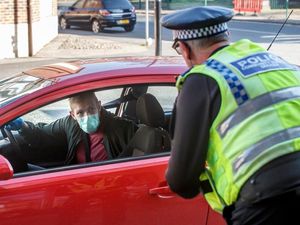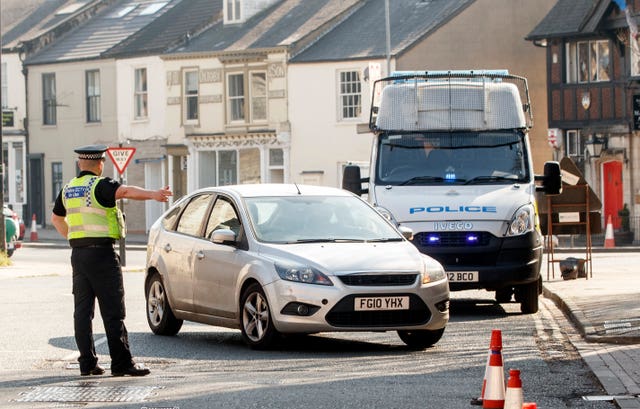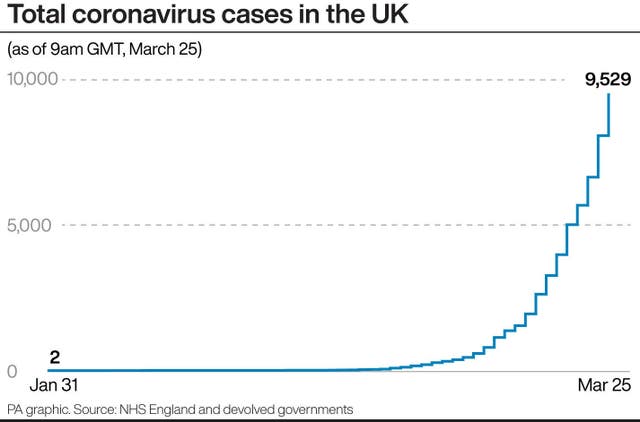Police given new powers to arrest people who ignore lockdown rules
Home Secretary Priti Patel said the enforcement powers were designed to ‘protect the public and keep people safe’.

People who continue to flout coronavirus lockdown rules will be breaking the law and could be arrested by police.
Those who ignore tougher restrictions on movement could be hit with a £60 fine initially and another for £120 for a second offence, the Home Office warned.
Officers in England were given the power to enforce rules on staying at home and avoiding non-essential travel as of 1pm on Thursday.
They can order members of the public to go home, leave an area, have the power to disperse a group, using “reasonable force, if necessary”.
Police can also take steps to make sure parents are stopping their children from breaking the rules.
Home Secretary Priti Patel said the powers were designed to “protect the public and keep people safe”.
But human rights campaigners raised concerns about the powers.
According to the guidance, the cost of initial fixed penalty notices will be cut to £30 if paid within 14 days and those who do not pay could be taken to court and risk facing costs for unlimited fines.
Refusing to provide a name and address to avoid being given a fine is an arrestable offence.
The Home Office said: “If an individual continues to refuse to comply, they will be acting unlawfully, and the police may arrest them where deemed proportionate and necessary.

“However, in the first instance, the police will always apply their common sense and discretion.”
Known as the Health Protection (Coronavirus, Restrictions) (England) Regulations 2020, similar rules will be in place across Scotland, Northern Ireland and Wales.
The Regulations state they are made “in response to the serious and imminent threat to public health” posed by Covid-19 and the Government considers the “restrictions and requirements imposed by these Regulations are proportionate to what they seek to achieve.”
The rules will be in place for an emergency period which must be reviewed at least once every 21 days, starting on April 16.
The news came as Derbyshire Police said people continued to drive to the Peak District for walks despite warnings to stay at home.
In a series of tweets, the force published drone footage of visitors and cars parked. It said people had moved a make-shift roadblock to one side to enter the car park.

Meanwhile other forces started to reveal plans to police the rules.
North Yorkshire Police said officers would be on foot patrol and stopping motorists at “checkpoints” from Thursday.
Drivers will be asked where they are going, why they are going there, and reminded of the rules on staying at home, according to the force.
Welsh force Dyfed-Powys, which covers Carmarthenshire, Ceredigion, Pembrokeshire and Powys, said it would be carrying out “high visibility patrols” and stop-checks on vehicles to make sure only those which need to travel are doing so.
Clare Collier, advocacy director at Liberty, said: “We’re extremely concerned by the extent of these coercive powers.
“This is a pandemic and so it should be treated as a public health issue.
“Instead the Government is treating it as a criminal justice issue, putting resources into detaining and criminalising.
“What’s concerning is what this heavy-handed approach will do to the public’s relationship with the police in the long-term.
“And while some people will feel reassured by a firmer police response to the pandemic, others will feel fear, especially groups who are already over-policed.
“We’ve seen an amazing response from communities to the pandemic, with neighbourhoods rallying together but trust and goodwill may break down in the face of authoritarianism and harsh policing.”
Several forces said they had closed police stations to the public in a bid to curb the spread of the virus, instead urging them to contact officers by calling 101 or 999 in an emergency.
In a bid to help bolster police numbers, the Government will allow civil servants who volunteer as special constables to “assist in the national effort to the greatest extent possible”.
Ministers have also pledged to relax tax and pension rules which could deter officers nearing retirement and those who have recently retired from returning to duty.




